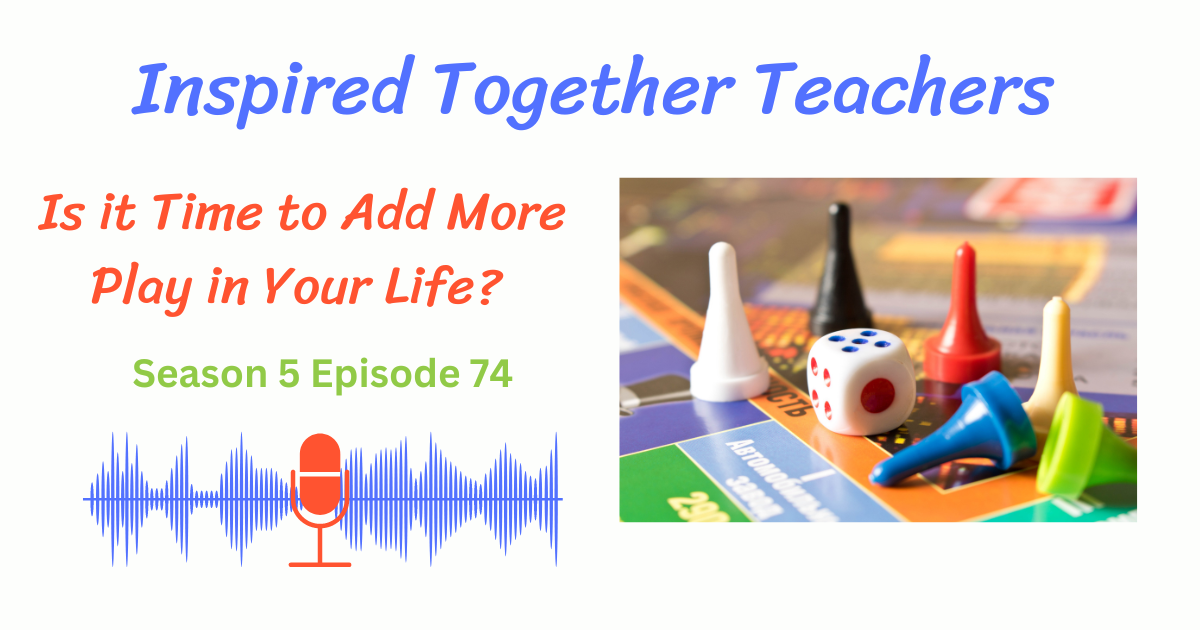8 Nonfiction Books that Can Change Your Life S. 5 E.75
 Listen to this episode to hear about some of our favorite nonfiction books that can change your life.
Listen to this episode to hear about some of our favorite nonfiction books that can change your life.
Show Notes:
Episode Summary:
Are you a reader? It’s no secret we love to read. We also love to share the best of the books that we read. Let’s talk about nonfiction books that can change your life!
Fiction is fun and relaxing and enjoyable, but nonfiction books allow you to learn and grow. They help you understand the world in a wider way, and build knowledge. Nonfiction books also grow your vocabulary, make you think, help you solve problems, and allow you to dig into interests.
Today we are going to share the best of the nonfiction books that we have read. Believe us when we say that these are nonfiction books that can change your life!
In this episode:
If you are a reader, we already know that even if we haven’t met, we are connected by the power of books. We both love to talk about books, to get new ideas from books, and to share the things we‘ve read.
This summer we’ve shared some of our favorite recent fiction books. We’ve also shared life lessons from some of our favorite children’s books, and children’s books with fabulous teachers.
Today we get to talk about some of our favorite nonfiction books.
Why do we read nonfiction books?
Michele: I read non-fiction in the morning. It motivates me, gets my brain working and gives me lots of ideas and inspiration. I always get ideas when I read informational text and get really excited when I can apply the ideas to my life or work.
Paula: I listen to fiction on audio but really appreciate non-fiction in a text form. I like to highlight and put notes all over in the margins. I usually have a non-fiction book or two that I am in the middle of in my purse, car or bookbag.
We are excited to share some of our favorite nonfiction books with you. While most of these books are carefully “researched” and many of them are written by scholars, none of them is overly scholarly, too stuffy or difficult to read.
Quiet: The Power of Introverts in a World That Can’t Stop Talking by Susan Cain
If you are an introvert, Susan Cain is speaking your language. Susan Cain helps you understand what it means to be an introvert, and more importantly, how it can be a strength.
If you are an extrovert, this book will help you relate better to an introverted spouse, child, friend or coworker. Michele recommended this to her sister who said it totally changed her relationship with her introverted son. This is a child who was surrounded by the extroverts in their family. After reading this, she understood her son’s strengths and learned how to help him be successful in his own way.
This is powerful, relationship building stuff!
DRIVE: The Surprising Truth About What Motivates Us by Daniel Pink
Drive explains motivation in a way that makes it easy to read and digest. Basically, everything you think you know about motivation is either true of an era in the past or just plain wrong.
If you want to understand what motivates you or others, this book will tell you and give you many examples of motivation that works today.
Teachers need to read this book. When you understand how motivate works, and you know which techniques to use. Even more importantly, which ones not to use.
Though this book starts out like a business book, don’t give up. All of the motivation ideas work for anyone. Pink also relates it to teachers and even has a full section on what it means for classrooms.
Worthy: How to Believe You are Enough and Transform Your Life by Jamie Kern Lima
Jamie Kern Lima is a highly successful entrepreneur and the founder of IT Cosmetics. She shares her personal journey, especially how she felt a lack of confidence in her life. When she started to be successful, she met Oprah, who offered to help her. Oprah gave Jamie her personal phone number and told her to call. Jamie held on to that number for years, but never called. She didn’t believe she was worthy of having Oprah mentor her.
When we conduct workshops, teachers often tell us about their lack of confidence. People, especially women, label themselves with words like failure, unattractive, too old or too young. They see themselves as damaged, or not smart enough, or not good enough. They feel like they are imposters, and worry that someone is going to call them out.
If any of this rings true for you, Jamie Kern Lima will take you on a journey to help you understand why you think the way you do. Worthy will help you transform your thinking and actions so that you can let yourself shine.
Here is a favorite quote from the book: “In life, you don’t soar to the level of your hopes and dreams, you stay stuck at the level of your self-worth. You don’t rise to what you believe is possible, you fall to what you believe you’re worthy of.”
Mindset: The New Psychology of Success by Carol Dweck
Mindset is not another book with success tips or habits. What Dweck presents here is a whole new way of thinking. It is a shift in understanding our mindset. Dweck’s concept is that there are two different mindsets, a fixed mindset or a growth mindset. Having a growth mindset is the path towards fulfilling your potential.
Once you read this, you will never be able to “unread it.” You will see fixed and growth mindsets in people you work with and students you teach.
Many teachers have been exposed to the idea of growth mindset. If you have never actually read the book, you will find it useful, not only for your life at school, but with family, friends, and others that you interact with every day.
Emotional Intelligence: Why It Can Matter More than IQ by Daniel Goleman
If you weren’t the valedictorian of your class but found out that you were very successful anyway, this book will explain why. It turns out that intellectual intelligence and life success aren’t particularly connected. Our view of human intelligence is far too narrow. Other abilities such as empathy, self-discipline, self-awareness, resilience, and grit matter more.
These skills have often been dismissed as “soft skills”. Fortunately, today there is a lot of discussion around social and emotional skills. We’re glad these topics are growing in importance.
We wish that every parent who believes that teachers should stay out of teaching any social or emotional skills would read this book.
Hidden Potential: The Science of Achieving Great Things by Adam Grant
Hidden Potential is about how people learn to understand potential in themselves and others, and then use it to do great things.
Grant shares lots of stories in this book. He describes someone who has hidden potential, and how they learn to see it and understand what they are capable of through the help, guidance or mentorship of others. Often, those others are teachers.
He talks about schools in one chapter, but there are connections for teachers all the way through. What would happen if we could see our own hidden potential and bring it out? What could happen if we could see the potential in all of our students and then help to bring it out?
We could absolutely change the world, and that is a powerful thing to strive for.
Braving the Wilderness: The Quest for True Belonging and the Courage to Stand Alone by Brené Brown
Brene Brown was a bit ahead of her time with this book. The world is even more divisive now than it was in 2017 when this book came out. We need it now more than ever.
At its core, this is a book about building relationships. In a divisive world, it is easy to take our ideas and back into a corner where we only seek to be with and understand people who share our vision and positions.
Brown encourages us to open up, to be vulnerable and courageous in being who we are and yet begin open to those who are cultural or ideologically different.
In doing so, we can recognize our true humanity, that at the core we share many things. Brown tells us that it is hard to hate people close up. It is an important idea in a world where there is too much hate.
After reading this book, you’ll understand both why and how to build stronger relationships.
Also by Brene Brown and worth mentioning is The Gifts of Imperfection: Let Go of Who You Think You are Supposed to be and Embrace Who You Really Are by Brené Brown
The Gifts of Imperfection would also go well with the book Worthy.
Flow: The Psychology of Optimal Experience by Mihaly Csikszentmihalyi
Don’t let the title scare you off. You know the feeling of flow- when everything is working well and when you are performing at your best. You are enjoying your work or activities and time just slips away from you. This is flow, the ultimate self-motivating experience. Who doesn’t want more of that?
This is the most scholarly of the books in this list, though you don’t need a PH.D. in Psychology to understand it.
Michele: This book has been very valuable in helping me understand what I need to do to live a life of intention. This is a book that makes you understand what makes people excited to greet the day and excited to be alive. Where you find flow, you will also find joy and love and happiness and ultimately, self-actualization.
If you struggle with motivation or motivating your students, this book will help you understand how we are motivated on a deep level.
Recap:
Thanks for listening as we shared some of our favorite nonfiction books. We hope you were inspired to read one, or listen to the audio version. Nonfiction books can educate, extend your knowledge base, inspire new ideas and give you suggestions for creating the life you want to live. They are truly nonfiction books that can change your life.
Quote:
“In life, you don’t soar to the level of your hopes and dreams, you stay stuck at the level of your self-worth. You don’t rise to what you believe is possible, you fall to what you believe you’re worthy of.”
Jamie Kern Lima
Resources mentioned in this episode:
Each of the books mentioned is highlighted in the text title.
Related Episodes/Blog Posts:
Inspired Together Teachers Podcast episode 68 Important Life- lessons from Children’s Books
Inspired Together Teachers Podcast episode 69 Our Best Summer Reading Suggestions
Inspired Together Teachers Podcast episode 72 Inspirational Teachers in Children’s Books
Connect with the Inspired Together Teachers Community:
Website: https:www.inspiredtogetherteachers.com
Instagram: Inspired-Together-Teachers
Facebook: Inspired Together Teachers
Facebook Inspired Together Teachers: Inspired Together Teachers Facebook Group
Linked In: Inspired Together Learning
More About Inspired Together Teachers:
Are you a teacher struggling to balance your best work with your best life?
If you are dedicated and caring but often overwhelmed and exhausted, join us at Inspired Together Teachers. We’ll give you inspiration, strategies and tips that help you navigate life’s challenges as a stronger, more confident, and more joy filled person, both in and out of the classroom.
Inspired Together Teachers will give you practical tools to experience more of what matters most in your life.
Co-hosts Paula Schmidt and Michele Vosberg are award winning educators with the experience and skills to help teachers thrive in life and work. They’ve taught at all levels, worked with thousands of teachers, and conducted workshops around the world. They are also the authors of the #1 best-selling book The Inspired Teachers Journal: A Weekly Guide to Becoming Your Best Self.
Paula and Michele would love to have you to join them on their quest to lived inspired lives.
This post may use affiliate links. If you purchase an item through our link, we will receive a small portion of the profit with no extra cost to you. This helps us to pay for the costs of bringing this free podcast to our community.






